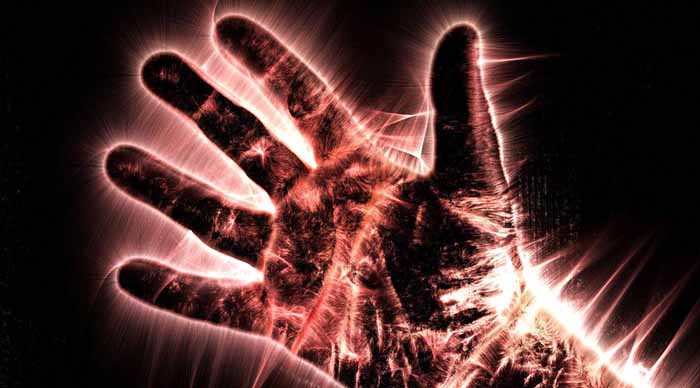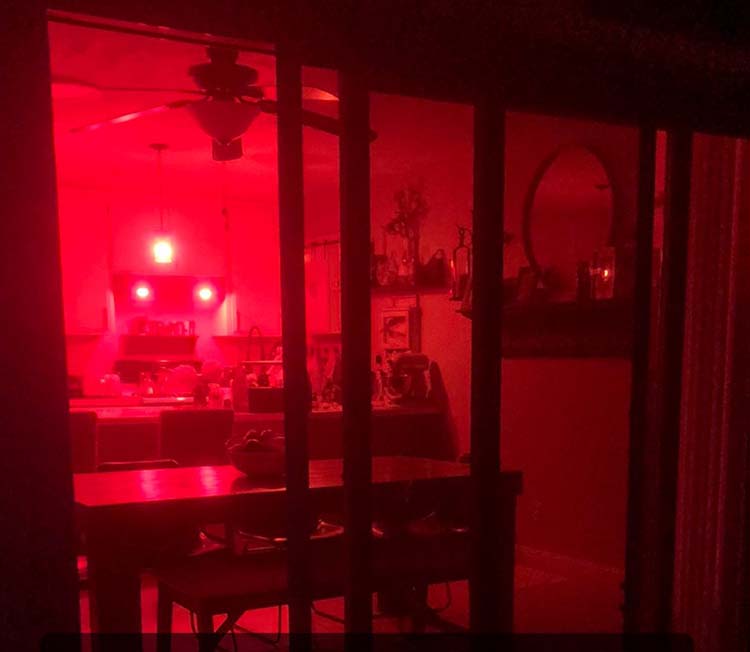When I first learned about light and its impact on sleep, hormones, energy and diseases like cancer it didn’t make sense. I couldn’t figure out how light can have that much of an impact on really anything.
As I continued to study the physics of light I was more and more blown away. I could study it for a lifetime and never know even 1% of what light is doing to us.
It completely fascinates me on every level.
It’s why I continue to learn and study it every day.
Why Light Is So Important
We are light beings. We have photoreceptors for photons of light inside our digestive tract. We have photoreceptors in our eyes, our skin and even our red blood cells are shaped in such a way as to receive photons of light.
Why would we need to get light inside of our gut?
Did you know what we make light inside our body that’s more powerful than the sun? Roeland Van Wijk wrote about what’s called Ultra-Weak Photon Emission. Mohsen Paul Sarfarazi also wrote a really interesting paper entitled, We are Beings of Light.
We produce light inside our body that is more powerful than the sun.
That sounds pretty outlandish but there a couple good books that go into this called The Fourth Phase of Water and The Body Electric. The scientist Fritz-Albert Popp first discovered biophotons in the 1970s and it has been revolutionary in the field quantum physics.
Here’s a quote from him
“We know today that man, essentially, is a being of light. And the modern science of photobiology … is presently proving this. In terms of healing, the implications are immense. We now know, for example, that quanta of light can initiate, or arrest, cascade-like reactions in the cells, and that genetic cellular damage can be virtually repaired, within hours, by faint beams of light. We are still on the threshold of fully understanding the complex relationship between light and life, but we can now say emphatically, that the function of our entire metabolism in dependent on light.”
Also all the food we eat is either full of photons from the sun or not. Food is light.
If we pick an apple off a fruit tree, we’re eating light that has been slowed down by matter. Real food is merely capture photonic energy from the sun.
You can even measure the amount of light radiating off a human body or any piece of organic material. The machine to do that was invented in the 1930s by a team of scientists at RCA (Radio Corporation of America). Its invention is mainly attributed to by Bernard A. Flory along with his colleagues and it’s called a photomultiplier.

Melatonin Production
Sunlight during the day signals to the pineal gland to stop producing melatonin. We make melatonin during the day and then we store it in our tissues, glands and organs. We store it to be released in the evening. When darkness comes it signals the body to start releasing melatonin from storage. If we have lights on in our home or look at blue lit screens without wearing blue blockers, then you’re going to significantly disturb your 24 hour sleep wake cycle.
Circadian Rhythm
Light frequency from the sun is the primary cue that sets and regulates your circadian rhythm. What kind of light are you exposed to? Do you look at a screen before getting sunlight into your eyes in the morning? Do you watch the sunrise?
When your naked eyes are exposed to natural light during the day, it suppresses melatonin so you feel awake and alert. It also increases cortisol levels and regulates hormones to help you feel alive and energetic. All of these happen through exposure to light during the day.
What is the best light for sleep? Sunlight during the day and complete darkness at night. We now know that artificial light at night (ALAN) disrupts circadian rhythms.
Hormone Signaling
Light directly impacts your circadian rhythms which in turn affect which hormones to secrete at what time. This is all controlled and regulated by the pineal gland, and suprachiasmatic nucleus in the hypothalamus of your brain.
When exposed to morning light the body suppresses melatonin secretion and starts releasing cortisol, which helps you feel awake and alert. When this happens, each cell is on their own internal timer. If you set a countdown timer to go off in 4 hours at 9am. Then at 1pm it’ll go off. But if you never get the right signal, the timer will either never be set or it might be set at 11am instead of 9am. This means the timer will go off at 3pm instead of 1pm.
At 1pm other hormones that should have been secreted, but now have to wait for the initial timer to go off. Since their internal timer is off those hormones cannot be released until 3pm. Every cell in every tissue has it’s own timer that constantly sends signals to the SCN in order to know what to do at what time.
When you’re exposed to the wrong light at the wrong time, all your hormones misfire in what’s called “circadian mismatches“.
Exposure to the right light at the right time is key for everything to work properly.
Sleep
In my quest for better sleep I finally figured out what is the best light for sleep….it’s no light at all! Or if you need light it’s red light. When the sun starts going down getting into the latter part of the day, your mitochondria detect this environmental shift.
As a result they send signals to the SCN to start producing melatonin after it gets dark. You probably have taken melatonin before and think of it as a sleeping pill. Melatonin is primarily an antioxidant electron donor that regulates your circadian rhythm.
You might think melatonin is to help you fall asleep. But staying asleep and the depth and quality of sleep is all tightly regulated by melatonin levels being released into the blood stream at the exact right time.
Exposing the photoreceptor cells in your skin or eyes to light at night is going to throw the timing system off by stopping melatonin release.
Bad Lights For Sleep
Fluorescent Bulbs
These bulbs emit a significant amount of blue light which disrupts circadian rhythms. They also contain mercury which is the 1st most toxic heavy metal on earth. Because these lights alter melatonin and disrupt your circadian rhythm, they can be the primary cause of just about every known sleep disorder including insomnia.
They also produce a high flicker rate which is imperceptible to the human eye but it is perceived by the human nervous system. The flicker rate can cause migraine headaches, oxidative stress in the eye causing macular degeneration, glaucoma and cataracts.
LED Bulbs
LED bulbs have become all the rage lately because of their cost effectiveness. Because they reduce all the other frequencies and wavelength of light, it takes less energy to produce them.
The light they produce is a hyper concentrated color temperature (typically 6,500 kelvin) devoid of all the other spectrum frequencies found in sunlight.
The ratios of light waves is critical for our biology. We know that shining a light through a window increases UVB in relation to UVA. Sunshine gives the exact ratio of UVA to UVB at the exact time we need it and in the exact amount we need it.
Windows alter these ratios as do lightbulbs. Again, what’s the best light for sleep? Definitely not LED or Fluorescents.
The best light for sleep is darkness.
LED bulbs also produce flicker that’s damaging to your nervous system and they produce a large amount of electromagnetic frequencies. If your LED lights can dim, they’re even worse.
Healthier Light Options
The best light for sleep is no light at all. Artificial light at night causes cancer. The most plausible reason why is because ALAN suppresses melatonin. Melatonin is your number one anti cancer hormone your body makes. Light at night reduces melatonin, which is what stops cancer growth. You don’t want to stop the thing that’s protecting you from disease.
So in terms of what the best light for sleep is, let’s dive into some healthier lightbulbs and options.
I’ll link below to some that I like.
But first we need to ask ourselves how did our ancestors live with no electrical grid and no light at night?
After the sunset, if they had any light at all (which was probably rare) there was either firelight (most natural) or candlelight.
Usually it’s fully dark around 30 minutes after sunset. Then maybe they had a bonfire for a couple hours after that. So that means, if the the sunset at 7pm, then one or two nights per week they had a fire until maybe 9 or 9:30.
After that, they went to bed.
This was human beings for thousands of years…until 1879 when every modern diseases (not just sleep issues like insomnia) started skyrocketing.

Here’s the title to a study I would highly recommend you read. It’s called: Artificial Light at Night and Cancer: Global Study
Conclusion: Artificial light at night is a significantly correlated for all forms of cancer including lung, breast, colorectal, and prostate cancer. Immediate measures should be taken to reduce artificial light at night in the main cities around the world.
Best Lights For Sleep
I’ll put them in order from best to worst.
- Total darkness – No optimal but ideal
- Firelight or candle light
- Red light bulbs
- Incandescent bulbs
- LED light – I DO NOT recommend
- Fluorescent light – I DO NOT recommend
Here’s a picture of our dining room from our backyard. We use the red bulbs from BonCharge and love them.

Conclusion
The best light for sleep is either no light or very dim red light. When the sun goes down, it’s time to go to sleep. Man’s sickness is due to his ability to negatively alter his environment. No other creature in nature is able to alter his environment like man can. As a result, we are sick, unable to sleep and you can see the result in our population. You don’t have to teach a monkey or hippo how to live close to nature.
The closer you mimic nature in your life and environment the better you’ll sleep, the more energy you’ll have, the healthier and longer you’ll live. Every study shows that. And it just makes intuitive sense. Live close to nature and be healthier.
Questions:
- What kind of lights do you have in your home?
- Would your partner be on board with getting red light bulbs?
- Do see the morning sun?
- Do yo get sunshine in your eyes during the day with no sunglasses on?

